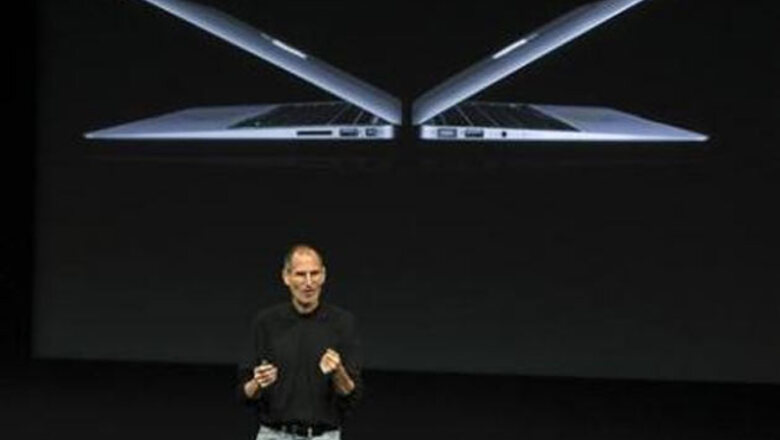
views
Cupertino: Apple Inc CEO Steve Jobs unveiled the thinnest, lightest Mac laptop yet, fusing features from its popular iPhone and iPad with its traditional line of personal computers.
Apple, whose computers have taken market share from PCs based on Microsoft Corp's Windows, will bring a version of its mobile applications store to the Mac, aiming to replicate its success and spur development of new programs.
Loading up Macs with iPad features may help Apple stave off investors' fears that sales will begin bleeding over to the tablet, which has stirred up astonishing demand.
The new MacBook Air - introduced on Wednesday with Jobs' signature "one last thing" set-up - is designed to reproduce the versatility of popular devices such as the iPhone and iPad, and will incorporate FaceTime video chats, which Apple is bringing to all its Macs.
Utilizing flash storage like the iPad rather than hard drives like conventional computers, it can power up almost instantly from standby mode and store data twice as quickly as a standard hard drive. But it sacrifices processing power compared with Apple's other laptops.
"We asked ourselves what would happen if a MacBook and an iPad hooked up? Well, this is the result," Jobs said at a media event in Cupertino, California, calling the Air the "future of notebooks."
It starts at $ 999 for an 11.6-inch model, weighs as little as 2.3 pounds (1 kg), and measures 0.11 inches at its thinnest to 0.68 inches at the rear.
"They're basically merging the product lines; they're simplifying it," said Kaufman Bros analyst Shaw Wu. "They're taking the strengths out of what they've learned on the iPhone and iPad and bringing that technology over to the Mac side. It makes a lot of sense."
Lions and cannibals
While plenty of attention is lavished on the iPhone and iPad, the Mac has been critical to the company's success over past years. Apple sold $ 22 billion worth of Macs in fiscal 2010, comprising one-third of its revenue. Shipments rose more than 30 percent and far outpaced the overall market.
Investors have wondered whether the iPad, a 10-inch touchscreen tablet that began selling in April from $ 499, would cannibalize sales of the Mac - as it has done for low-end, Windows-based laptops known as netbooks.
Gartner analyst Mike McGuire does not expect much cannibalization between iPad and Macs because of the gulf in price tags. He said the Air will try to bridge Apple's newer and older product lines.
"It's that missing link between the tablet future and the existing notebook," he said.
Jobs also showed off a new version of Mac operating software, which the company will release next summer. Nicknamed "Lion," it includes an improved "iLife" multimedia suite and incorporates FaceTime video chat, which the company recently launched on the iPhone.
FaceTime will allow for video calls between iPhones, iPod touches and Macs. Over 19 million Apple devices are already equipped with FaceTime, Jobs said. It released a test version of FaceTime for the Mac on Wednesday.
The App Store for the Mac will go live within 90 days, and developers will be able to start submitting apps next month. They will get 70 percent of the revenue from sales.
The original App Store debuted in 2008 and helped spur sales of the iPhone by providing a wealth of fun, useful or merely diverting programs for sale, at the touch of a button.
It houses more than 250,000 apps and has generated over 7 billion downloads. In addition, more than 30,000 apps have been specifically made for the iPad.
In the third calendar quarter, Apple became the No. 3 personal computer maker in the United States with a 10.6 percent market share, according to IDC. It holds roughly 20 percent of the US consumer market.
But Apple's global market share is less than 5 percent, and the company is aiming to increase sales outside its US stronghold. The Mac user base overall now stands at nearly 50 million.
Apple shares rose 0.3 percent to close at $ 310.53 on Nasdaq.




















Comments
0 comment